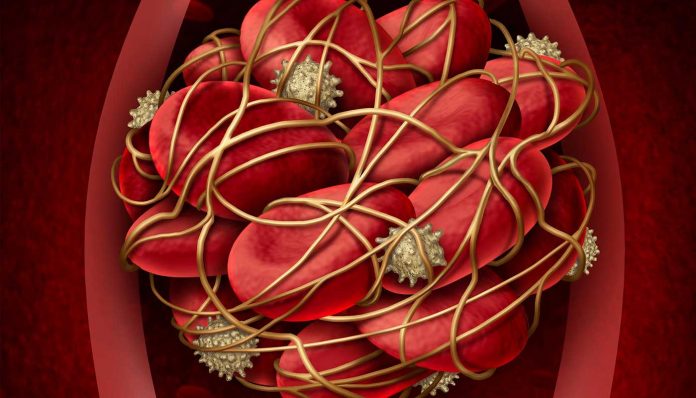You are cutting vegetables, one accidental slip and your finger is bleeding. You are on your bike and you swerve to avoid a squirrel. The next minute you are on the ground and your knees are bleeding. In both situations, you might curse, but you are not too worried because you know the blood will soon clot and the bleeding will stop. But what if your blood clots too easily? This could be a sign of thrombophilia, when the blood has an increased tendency to form clots.
In affected individuals, a blood clot can form at anytime, under any condition, anywhere in the body. Deep vein thrombosis (DVT) is the most common type of venous thrombosis, when blood clots block one or more deep veins, commonly in the legs. Over 600,000 people in the US are affected by DVT each year and about a third of them require hospitalization. A serious complication of DVT occurs when the clot breaks loose and travels to the lungs, causing a pulmonary embolism, blocking veins that cut off the blood supply to the lungs. According to the Center for Disease Control, up to 100,000 people in the US will be affected by pulmonary embolisms each year.
Risk factors for thrombophilia can either be inherited or due to lifestyle choices that we make. Often when there is a family history of blood clots, genetic tests are used to determine the risk of venous thrombosis. Typically the test looks at three genes, F5 (Factor V), F2 (Prothrombin) and MTHFR, to assess an individual’s risk for thrombophilia. The F5 gene encodes the Factor V clotting factor. When people inherit a genetic variant of F5 called Factor V Leiden, it becomes difficult to turn off this clotting agent, increasing the risk of abnormal blood clotting. Prothrombin (encoded by the F2 gene) is also involved in blood clotting. Individuals with a genetic variant of prothrombin make too much of this factor, which again stimulates blood clot formation. MTHFR encodes an enzyme that controls the levels of homocysteine in the blood, a chemical that promotes blood clotting. Elevated homocysteine levels are detected in individuals with a genetically altered version of MTHFR. These genetic variants can work alone or together to increase the risk of thrombophilia.
Not all people with these genetic defects will develop blood clots. However, their presence predisposes individuals to venous thrombosis. For example, 60% of the people with inherited thrombophilia carry the Factor V Leiden mutation. Inheriting two copies of the Factor V Leiden mutation increases the risk of venous thrombosis by 80-fold. If an individual inherits this Factor V variant, along with a defective MTHFR gene, the risk is increased even further. Apart from the increased risk of thrombophilia, the MTHFR gene variant also predisposes a person to the risk of heart attack and complications during pregnancy.
Luckily, even if you are genetically susceptible to thrombophilia, the risks can be managed. Lifestyle choices that raise blood pressure, like smoking, will increase the risk of forming harmful blood clots, while a healthy diet, drinking enough water, regular stretching, and exercises that promote blood flow will all minimize the risk of clotting. If the clots are detected early they can also be effectively treated with blood thinners. Thrombophilia may be life threatening, but by identifying risk factors, by making wise choices towards prevention and by regular visits with a doctor, it is possible to live a long and healthy life.





